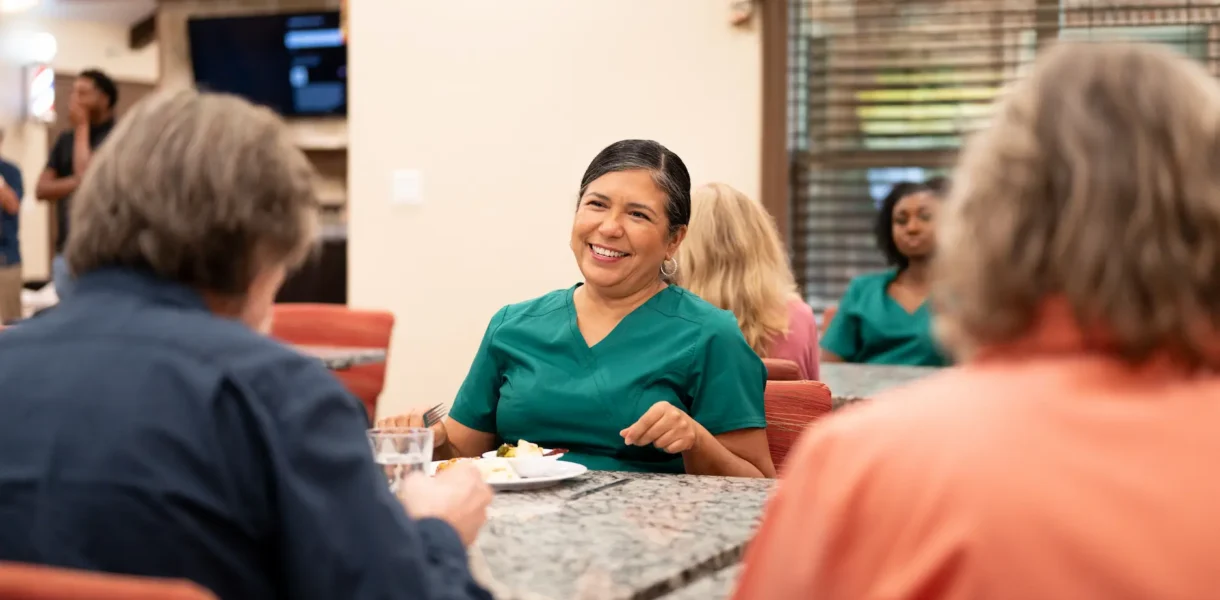
Communication Tips for Talking with Someone with Dementia
Communicating with a loved one who has dementia can be a challenging experience. Changes in memory, thinking, and language skills can create barriers, but with the right approach, you can still connect in a meaningful way. Here are some tips to help you navigate your conversations.
Approach with Empathy
Remember that dementia affects cognitive abilities, and your loved one may not always understand or remember things as they once did. Approach conversations with patience, empathy, and a calm attitude. Avoid correcting or arguing and instead focus on the emotions behind their words. Validating their feelings and experiences can help reassure your loved one that you’re there to support them.
Keep it Simple and Direct
Use short, simple sentences and avoid complex vocabulary or abstract concepts. Speak slowly and clearly, allowing time for them to process information. Ask one question at a time and give them ample time to respond. Avoid open-ended questions like “What would you like to do?” and instead offer specific choices like, “Would you like to go for a walk or do an art project?”
Create a Calm and Comfortable Environment
Minimize distractions like loud noises or busy environments. Choose a quiet space with good lighting and comfortable seating. If they seem overwhelmed, gently redirect their attention to a more calming activity.
Share Stories and Memories
Reminiscing about happy memories can be a powerful way to connect. Look through old photos, listen to their favorite music, or talk about shared experiences. This can spark joy, reduce anxiety, and strengthen your bond.
Adapt to Their Communication Style
Pay attention to their preferred way of communicating. Some may prefer visual cues, while others may respond better to verbal communication or touch. Be flexible and adapt your approach to their individual needs.
Seek Support
Communicating with someone with dementia can be emotionally challenging. Don’t hesitate to seek support from family, friends, or professional caregivers. Support groups and counseling services can also provide valuable resources and guidance.
At Avalon Memory Care, we understand the unique challenges of communicating with loved ones experiencing dementia. Our compassionate team is dedicated to providing personalized care and support, fostering meaningful connections, and enriching the lives of those we serve.
If you’re seeking guidance or assistance with dementia care, contact us and learn more about our specialized memory care programs.
See More Articles
-
Visiting Your Aging Parent With Memory Loss at Avalon Memory Care
As a loving son or daughter, you naturally want the best of care for your senior parent. The compassionate assisted living caregivers at Avalon Memory Care want you to know that while your parent is living with us, he or she will receive nothing less than respectful, loving care within our comfortable, safe, and fully-staffed
-
Celebrating New Year’s Day in Memory Care
Families often find that celebrations with their loved ones in memory care are easier when they embrace new traditions. For instance, it may not be practical to expect your loved one to stay up until midnight on New Year’s Eve. Instead, consider throwing a New Year’s Day celebration, complete with a countdown to the first
-
Hope For the Future: Emerging Alzheimer’s Research
According to the latest statistics, as many as 5.5 million Americans are living with Alzheimer’s disease, and its prevalence is only expected to rise in the next few decades. At the same time, however, research into treatments for the condition is accelerating. With every passing year, we move a little further down the road toward
Testimonials
Downloadable Resources
We Are Avalon
Discover the heart of our community; download ‘We Are Avalon’ to get to know our dedicated team and our commitment to providing a warm, family-like environment.
Transitional Care Guide
If you’re considering a transition, we’re here to help; download our Transitional Care Guide for compassionate guidance through each step of the process.
Schedule a Tour
Visit one of our 30+ campuses and experience our unique approach to memory care.












